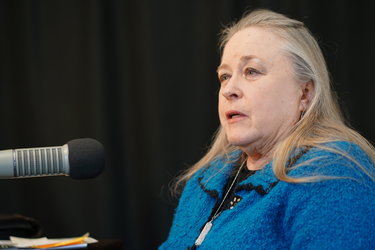Col. Christine Rem offers a home to women vets who need one
Christine Rem, a nurse and retired Army colonel, has spent a lifetime preparing for the role she has now created for herself — helping women veterans.
She purchased the Victorian row house in South Troy that had belonged to her grandparents and refurbished it, paying for much of it herself, to serve homeless veterans. The first woman took up residence this month.
Rem’s journey to this moment started a lifetime ago.
She grew up poor in Troy and graduated from Samaritan Hospital School of Nursing when she was 17 years old. She worked at Samaritan for years, helping children and new mothers.
In 1982, in her thirties, Rem joined the Army Reserve.
“Once I got in the Army Reserve, I met my first role-model women,” says Rem in this week’s Enterprise podcast. She also met the man who would become her husband, and talked him into becoming a nurse.
During her 30 years of military service, Rem spent six years in active duty, including two tours in Germany and a year in Iraq.
At that point, Rem was a lieutenant colonel and was one of 11 people selected to serve on a provincial reconstruction team with the Department of State. She and the others met with President George W. Bush and Secretary of State Condoleezza Rice.
After extensive training, Rem was part of a three-person team stationed in Ramadi in Iraq, assigned to health and education. “Five days a week, I went out in a convoy and worked with the Iraqi people to determine what their needs were,” said Rem.
“It’s a male culture,” she said and at first she was nervous, being a woman in uniform rather than covered with a veil. But, she said, “They respected my rank and what we were there to do.”
Rem also said, “The people back home think you’re going to go work and fight the enemy … I went over there to work with the people who weren’t the enemy — but some of them might be — and you’re supposed to develop a trusting relationship.”
She described the scene as being like movies she’d watched set in bombed-out Berlin after World War II. “There was no running water. There was electricity only one hour a day. The sewer system was blown up. The water system was blown up. The roads were blown up.”
Rem said she is struggling now, with a sense of déjà vu, as she watches scenes unfold from the war in Ukraine.
In Iraq, most of the doctors and teachers had fled the country she said. Farmers and shepherds remained. “They just want to do what they’d always done. And now they’re trying to be made into soldiers … Most of the men had been killed in conflicts. So the largest part of the population was women and children and orphans.”
Rem said she had “some very moving experiences” in Iraq and remembered a boy who had wanted her to adopt him. “I just can’t bring someone from one culture back to the other culture …. So a lot of it was really sad,” said Rem.
Rem is now going to use the skills she learned building trust to serve as a caseworker for the homeless women who come to live at 515 First Street in Troy.
She has named the home Christopher House after her husband, who served for 42 years in the Army before dying in 2012 on active duty while awaiting a medical retirement.
Rem’s grandparents, John and Frances Guski, Polish immigrants, had raised their nine children in the house.
During her military career, Rem continued her education, earning a bachelor’s degree in nursing; a master’s degree in nursing administration; and finally, at Russell Sage College, a doctor of nursing degree in science education and leadership.
Her doctoral thesis centered on homeless veterans. They weren’t easy to find for interviews.
“Most people are embarrassed. They’ll live in their car or on their friend’s couch ….,” said Rem. “They’re proud. They don’t want to say that they’re homeless.”
Rem originally thought she would use Christopher House for women just out of the military who needed support for a transitional year or two. “But what I found was not what I expected,” she said. “They were 40 and 50. They weren’t 21 or 22. Their service was 20 years ago, not during wartime.”
Some of the homeless women had been divorced or struggled with alcohol or drug problems. Women face “big barriers,” Rem said, in being unemployed, or underemployed and in finding affordable housing.
So Rem has developed a program that will support these veterans long-term. They will live, like family, in a household with shared cooking and cleaning duties.
During the podcast, Rem discussed Christopher House and the organization she founded, Capital District WomenVeterans, with a supporter who lives in Guilderland — Raymond Thiess.
Theiss is a Vietnam veteran. “I’m one of the first groups that, when we came back, were not treated like previous veterans,” he said. “Vietnam veterans said, we won’t let our future veterans be treated the same way.”
So, when Thiess saw that the Veterans Administration was not giving women enough care, he thought, “Why should they not be treated the same as men? …. I was actually shocked when I heard about the sexual abuse that women veterans have,” he said.
Rem noted that the VA initially served men. “It’s a hard way of thinking to get rid of because it’s kind of embedded in your mind,” she said. “You think of the patients of the VA as men veterans, as combat war veterans,” Rem said, which made women feel they didn’t belong.
Women now make up 14 percent of the military in the United States, Rem said. The nation has 200 million veterans of which 2 million are women, she said, but only 729,986 are enrolled in the VA. That leaves nearly 1.3 million women veterans who are not enrolled in the VA.
Sometimes VA staff would assume female veterans were wives of veterans rather than veterans themselves. “There were all these men who had been to war,” said Rem. “And even though some of the women may have been to war, they still didn’t feel that they did what the men did, because we were in roles of support — of nursing and things like that.”
“I know myself, although I’m a combat vet and I’ve got a Purple Heart,” said Thiess, “whatever the service I did in Vietnam was not like the typical infantry person, the typical artillery person, the typical cavalry person.”
Thiess said about 15 percent of people in military service are in combat. “The rest of them are supplying those combatants what they need — your truck drivers, your cooks, your supply people, whatever.”
Although Thiess spent two months in the field in Vietnam with a combat unit, most of the time he was an instructor, preparing troops for battle. “I’m conflicted about it,” said Thiess. “My service compared to somebody that was an infantryman, slopping around rice patties or the jungle or whatever as compared to myself.
“Who’s more, I hate to say, worthy?” he asked.
“That’s the key word,” Rem interjected. “A lot of the women don’t step forward.” Interviewing homeless women veterans for her thesis, she learned, “They did not feel worthy.”
“So I’ve been a little conflicted with that,” Thiess went on. “But, when you’re in the military, you do what you’re told to do. What difference does it make? … You served. You did what you were told to do. They’re my brothers and sisters,” he said of other veterans. “Women need help. They’re my sisters. We help.
“Doesn’t make any difference. They served this country honorably. Give them the respect they deserve and the services they need, when they need them.”



